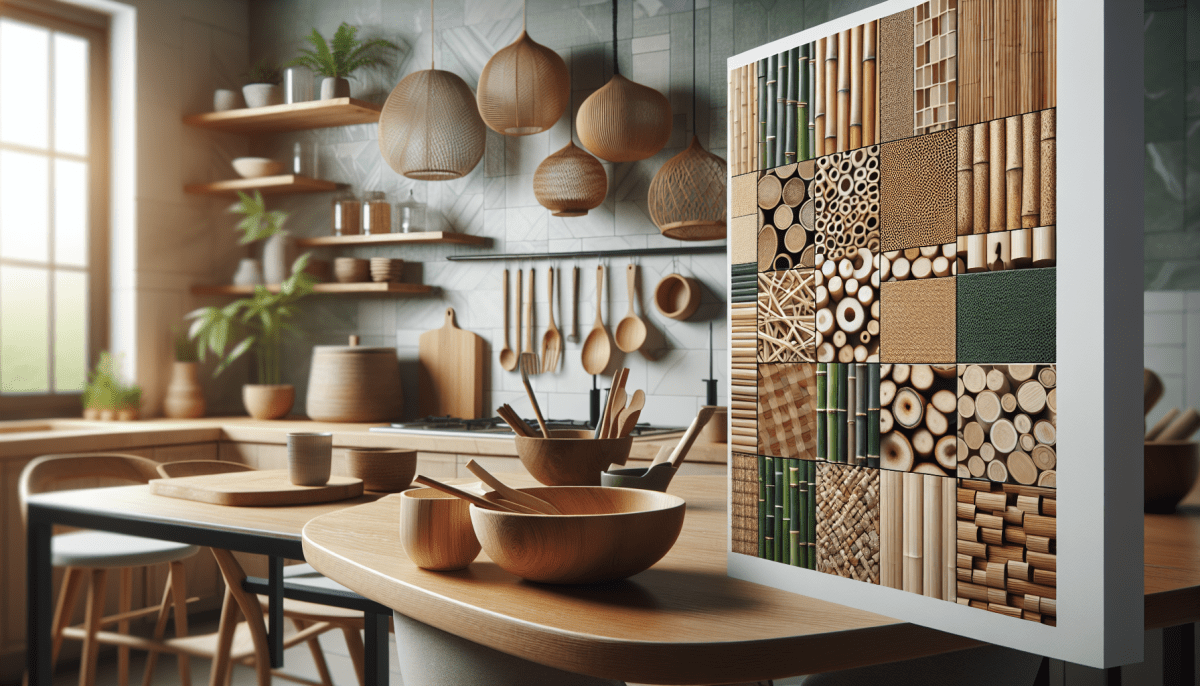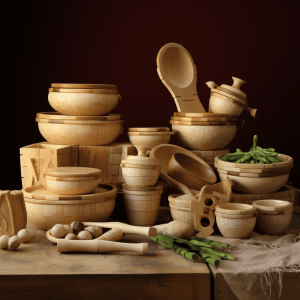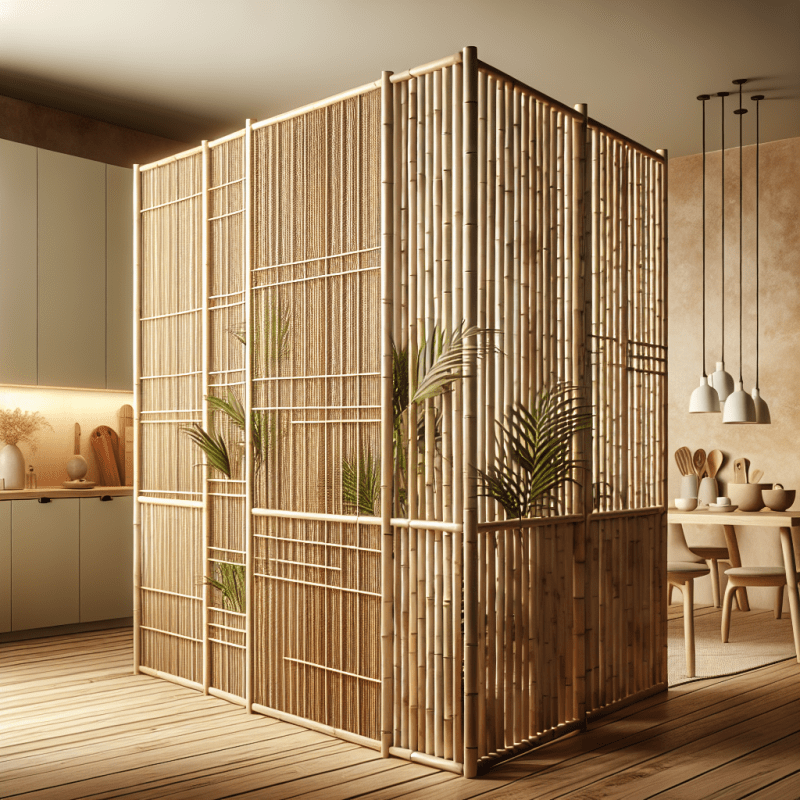Environmental Benefits: Exploring the Advantages of Bamboo as a Sustainable Material
Bamboo, a versatile and rapidly renewable resource, is gaining popularity as a sustainable material for a variety of purposes. Its numerous environmental benefits make it an attractive alternative to traditional materials such as wood and plastic. Let's delve into some of the advantages of bamboo and understand why it is being hailed as a sustainability champion.
1. Rapid Growth and High Yield
One of the key reasons bamboo stands out as a sustainable resource is its rapid growth rate. Unlike conventional trees that can take decades to mature, bamboo can be harvested in just a few years, making it highly renewable. It is the fastest-growing plant on earth, with some species growing up to 90 centimeters (35 inches) daily! Additionally, a single bamboo clump can yield multiple stems, maximizing the usable material obtained from each plant.
2. Minimal Environmental Impact
Bamboo is considered an eco-friendly material due to its minimal environmental impact. Unlike traditional timber harvesting, which often involves deforestation and disrupted delicate ecosystems, bamboo forests can thrive on degraded and marginal lands unsuitable for other crops. The extensive root network of bamboo plants helps prevent soil erosion, stabilize hillsides, and improve water quality by filtering and absorbing pollutants.
3. Carbon Sequestration
Another remarkable environmental benefit of bamboo is its ability to sequester carbon dioxide. As bamboo grows, it absorbs more CO2 from the atmosphere than other plants, helping mitigate the effects of climate change. Some studies estimate that bamboo can absorb up to four times the amount of CO2 and release 35% more oxygen than an equivalent stand of trees.
4. Reduced Pesticide Use and Water Requirements
Bamboo is naturally pest-resistant due to bamboo-kun, an antimicrobial bio-agent. This characteristic eliminates the need for chemical pesticides and herbicides, reducing environmental pollution and protecting the health of farmers and surrounding communities. Additionally, bamboo requires significantly less water compared to traditional crops, making it an attractive alternative in regions facing water scarcity.
5. Versatility and Longevity
Bamboo's versatility contributes to its sustainable reputation. It can be used for a wide range of applications, including construction, furniture, flooring, textiles, and even as a renewable energy source. Its strength, durability, and flexibility make it a viable alternative to hardwood and other synthetic materials. Moreover, bamboo products have a long lifespan, reducing the need for frequent replacements and lowering overall resource consumption.
In conclusion, bamboo emerges as a compelling sustainable material due to its rapid growth, high yield, minimal environmental impact, carbon sequestration capabilities, reduced pesticide use and water requirements, as well as its versatility and longevity. As we strive towards a greener future, embracing bamboo and its countless environmental benefits undoubtedly contributes to a more sustainable and eco-conscious world.
Versatility and Durability: Unveiling the Practical and Long-lasting Uses of Bamboo
Known for its incredible versatility and unmatched durability, humans have utilized bamboo for centuries. This remarkable plant offers a sustainable solution to many of our daily needs and presents a wide range of practical and long-lasting uses across various industries.
Construction and Architecture
One of the most significant applications of bamboo is in construction and architecture. Its exceptional strength-to-weight ratio makes it a preferred choice for building and structural purposes. Bamboo can create sturdy and long-lasting structures such as bridges, scaffolding, and even entire buildings. Many architects and designers increasingly incorporate bamboo into their projects, appreciating its aesthetic appeal and eco-friendly nature.
Furniture and Home Decor
Bamboo's versatility also extends to the world of furniture and home decor. With its natural beauty and durability, bamboo is commonly used to craft various items like chairs, tables, shelves, and even entire bedroom sets. From sleek and modern designs to rustic and traditional styles, bamboo furniture can effortlessly complement any interior decor while providing an eco-friendly alternative to traditional wood furniture.
Textiles and Fashion
Another fascinating use of bamboo lies in the textile and fashion industry. Bamboo fabric, often referred to as "bamboo viscose," offers numerous benefits. It is exceptionally soft, hypoallergenic, moisture-wicking, and more breathable compared to other fabrics. Additionally, bamboo textiles possess natural antibacterial properties, making them an excellent choice for clothing, bedding, towels, and other textiles.
Energy and Biomass
Bamboo is a reliable and sustainable energy and biomass production source. Its rapid growth and high yield make it ideal for generating biomass energy, as it can efficiently convert into biofuels or be used for heat and power generation. By harnessing bamboo's energy potential, communities can reduce their reliance on non-renewable resources and contribute to a greener, more sustainable future.
Culinary and Dietary Uses
Beyond structural and textile applications, bamboo plays an essential role in culinary traditions worldwide. Bamboo shoots, a common ingredient in many Asian cuisines, are not only delicious but also offer a multitude of health benefits. These tender and crisp young bamboo stems are packed with nutrients, antioxidants, and essential amino acids, making them a valuable addition to a balanced diet.
Environmental Benefits
Aside from its myriad of practical uses, bamboo offers significant environmental benefits. As one of the fastest-growing plants on the planet, it can be harvested in a short cycle, often within three to five years, unlike traditional timber that takes decades to mature. Bamboo also has the remarkable ability to absorb large amounts of carbon dioxide and release a substantial amount of oxygen in return, aiding in combating climate change and improving air quality.
In conclusion, the versatility and durability of bamboo are truly remarkable. Bamboo is a sustainable and long-lasting solution for numerous industries, from its use in construction and furniture-making to its applications in textiles, energy production, and cuisine. As we continue to prioritize environmental conservation and sustainability, utilizing bamboo in various aspects of our daily lives can contribute to a greener and more sustainable future.
Health and Wellness: Discovering the Surprising Benefits of Bamboo in Promoting Healthy Living
Bamboo, often associated with its versatile use in construction and furniture, holds surprising benefits for promoting overall health and wellness. Bamboo-based products have gained popularity from skincare to bedding due to their natural properties and eco-friendly nature. Let us explore why incorporating bamboo into our daily lives can have a profound impact on our well-being.
Natural Antibacterial and Antifungal Properties
One of the remarkable characteristics of bamboo is its natural resistance to bacteria and fungi. Bamboo fibers contain an antimicrobial bio-agent called "bamboo-kun," which prevents the growth of harmful microorganisms. By choosing bamboo-based products like towels, bedding, and clothing, we can minimize the risk of infections and allergies, making it an ideal choice for individuals with sensitive skin.
Breathability and Moisture Absorption
Bamboo fabric allows for exceptional breathability, making it a suitable choice for clothing options, especially during warm weather. It has micro-gaps and micro-holes, allowing air circulation and promoting moisture absorption, keeping our bodies cool and dry. This moisture-wicking quality of bamboo-based fabrics helps prevent sweat build-up and the growth of odor-causing bacteria, enhancing our comfort and confidence throughout the day.
Hypoallergenic and Skin-friendly
For individuals with allergies or skin sensitivities, bamboo-based products can be a game-changer. Bamboo fibers have a smooth and round surface, significantly reducing the risk of skin irritation and allergic reactions. They are also naturally hypoallergenic, making them an excellent choice for those prone to eczema, rashes, or other skin conditions. By using bamboo-based skincare products or incorporating bamboo fabrics into our daily routines, we can nurture and protect our skin.
Sustainable and Eco-Friendly
In addition to the health benefits it offers, bamboo is an incredibly sustainable and eco-friendly resource. Bamboo is known to be the fastest-growing plant on Earth, capable of reaching maturity within 3-5 years. Unlike traditional timber, bamboo farming requires minimal water, pesticides, or fertilizers. It also releases a significant amount of oxygen into the atmosphere, contributing to a healthier environment. By choosing bamboo, we can support sustainable practices and minimize our ecological footprint.
Incorporating bamboo into our lives goes beyond its aesthetic appeal and practical uses. The remarkable health benefits it provides, including its antibacterial properties, breathability, hypoallergenic nature, and sustainability, make it an excellent choice for promoting healthy living. Whether it's using bamboo-based skincare products, clothing, or bedding, embracing this natural resource can significantly contribute to our overall well-being and the well-being of our planet.
Bamboo Cookware
Sustainable and Stylish Cookware to Elevate Your Kitchen Experience
Product information
Product Review Score
4.38 out of 5 stars
126 reviews


